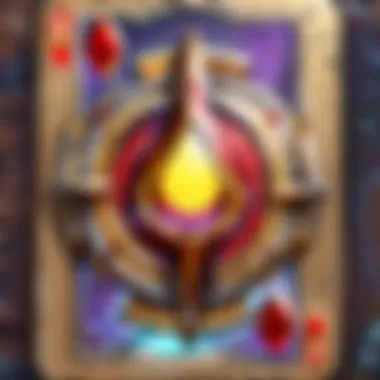Blackjack Apprenticeship: Mastering Techniques and Mindset


Intro
Blackjack is not just a mere casino game. It is a strategic sport that combines chance with skill. For many, mastering blackjack becomes a passionate pursuit. The journey of a blackjack apprentice involves much more than merely understanding the rules; it demands a comprehensive grasp of strategies, mental fortitude, and continuous practice. The ultimate goal is to cultivate proficiency that can rival even experienced players.
This guide seeks to unfold everyday components of blackjack mastery. From essential knowledge required for beginners to advanced strategies utilized by professionals, each section plays a crucial role in shaping the journey of an apprentice. Emphasis will be placed on both theoretical understanding and practical application, ensuring respect for the game while acknowledging its complexities.
In this exploration, you will encounter fundamentals, training methods, and analytical techniques that foster an effective learning experience. Mastery is not an end point, but a continuous journey of improvement and understanding. Let's delve into the art of blackjack apprenticeship.
Understanding Blackjack
Understanding the game of blackjack is essential for anyone eager to master its intricacies. This foundation shapes how players approach the game and the strategies they will employ later on. Blackjack is not just about luck but a blend of skills, strategies, and psychological stances. Gaining an insight into its myriad elements can lead to a more structured and successful gameplay approach.
Origins and Evolution of Blackjack
The origins of blackjack are often traced back to various card games in Europe. Its earliest known ancestor is the French game Vingt-et-Un, played in the 18th century. This game included fundamental similarities, such as the objective of reaching a score of 21 without going over. Over time, Vingt-et-Un made its way to the United States, where it merged with several other games and underwent several changes. The contemporary rules emerged in the early 20th century, further solidified by casinos that sought to enhance player engagement with bonus payouts for specific card combinations, such as a natural blackjack.
Knowledge of this history is valuable as it provides context to the game's regulations and how specific plays evolved, influencing modern strategies.
Basic Rules and Gameplay Mechanics
The basic rules of blackjack are straightforward yet essential for effective gameplay. Players are dealt two cards while the dealer receives one face-up card and one face-down card. The aim is to get a hand total closest to 21. Points are assigned as follows:
- Numbered cards have their face value.
- Kings, Queens, and Jacks are worth 10.
- An Ace can be worth 1 or 11, depending on what will benefit the hand most.
Players can choose to hit (receive another card), stand (keep the current hand), double down, or split pairs, depending on their hand value and strategic understanding. Each action can make a significant impact on the outcome.
Consolidating these rules is important as they form the building blocks of strategic play. Grip on these fundamentals can unlock advanced strategies crucial for becoming a successful player.
The Role of Strategy in Blackjack
Strategy plays a pivotal role in blackjack. While luck is always present, informed decisions can significantly increase a player's edge at the table. A key component of strategy is the basic strategy chart, which outlines the optimal actions depending on the dealer's visible card and the player's total. Familiarity with this chart improves decision-making and reduces the house edge considerably.
Moreover, understanding when to deviate from basic strategy, for example, based on card counting, can serve to further enhance a player's advantage. Strategic play mitigates risk by emphasizing the importance of statistical principles governing the game.
Blackjack should be viewed primarily as both skillful execution and sound decision-making, responsibilities ingrained from the moment one takes on the challenge.
“Success in blackjack requires insight into rules, strategies, and self-discipline.”
Intro to Blackjack Apprenticeship
Understanding the concept of a blackjack apprenticeship is fundamental for any player ready to enhance their game. This section emphasizes the path one takes to gain mastery over blackjack through structured learning and strategic insights. Apprenticeship is not merely about learning the rules; it encompasses a deep dive into the art and science of winning at the tables. Players can harness this experience to navigate the complexities of the game, adapting strategies that cater to different situations.
Defining Apprenticeship in Blackjack
Apprenticeship in blackjack revolves around systematic training and practice aimed at raising one’s skills. It is a structured method that combines theoretical knowledge with practical applications. This might include:
- Understanding game rules comprehensively.
- Embracing statistical elements behind the game.
- Regular practice sessions to instill confidence.
The focus of apprenticeship is not just skill acquisition but the deliberate application of that skill in live environments. The rigorous approach prepares players to understand dynamics at play, such as dealer behaviors and table conditions.
Purpose and Goals of the Apprenticeship
The ultimate purpose of engaging in a blackjack apprenticeship is to develop competencies that extend beyond rote knowledge. Effective apprenticeship should encompass:
- Skill Development: Cultivating practical skills that translate into effectively playing blackjack.
- Mindset Formation: Growing a disciplined mindset that is essential for mental endurance at casinos.
- Understanding Variability: Comprehending variations of rules that apply in different gaming environments.
- Assessing Risk: Evolving strategies to minimize losses and maximize gains.
By setting clear goals, a blackjack apprentice can navigate their journey through novice tactics to advanced player strategies, laying a solid foundation for potential betting winingst.
Essential Skills for a Blackjack Apprentice
Mastering blackjack requires more than just familiarity with rules. Essential skills develop your competence at the table. These skills lay the groundwork for technique refinement and strategic enhancement. Without these core abilities, advanced strategies would hold limited value. They connect your theoretical knowledge with practical experience in gaming. This section elaborates upon necessary skills every aspiring blackjack apprentice must cultivate.


Mathematical Foundations and Probability
Mathematics serves as the backbone of blackjack. Apostles of the game should have a solid command of probability, which dictates outcomes under various conditions. Using basic math, you'll also better understand payouts, losses, and gains over time.
Playing blackjack involves making decisions under uncertainty. Knowing odds allows you to evaluate the potential of winning. For example, calculating the statistical probability of drawing a certain card crafts a strong decision-making framework. In employing smaller basic equations, simplicity emerges. As the data gathers textually, statistical reasoning materializes, dictating your playing style.
Key Points on Probability in Blackjack:
- Basic Probabilistic Calculations: Understand the likelihood of different card sequences.
- Long-term Odds Assessment: Grasp the difference between long-term expectations vs. short-term luck.
- Payout Analysis: Evaluate how different table rules affect returns.
Familiarity with probability not only informs tactics but also minimizes emotional responses during gameplay.
Card Counting Techniques
Card counting provides a cornerstone for Blackjack as an advanced skill set. It involves keeping track of the ratio of high cards to low cards remaining in the deck. By establishing which cards are active, you tilt the favorable outcome back in your direction. Successful card counters utilize precise tracking mathematical techniques.
Effective Estimation Techniques Include:
- Hi-Lo System: Assigning values 1, 0, and -1 to cards enables continual score adjustments.
- Count Conversion: Switch calculations as new cards arrive, expanding precision.
- Bet Sizing Adjustments: Teach yourself when to increase bets based on positive counts.
Card counting is often readily demonized or glamorized, but truly, it's simply a measurement system requiring deliberate practice and resolve. Counter to popular belief, continuous winning is improbable; skill lies in enhancing probability on your side.
Emotional Control and Discipline
Emotion management plays a pivotal function in blackjack. The capacity to maintain your composure defines effectiveness at the table. Emotion can skew rational decision-making. Possessing emotional control translates to maintaining firm results amid turbulence of both wins and losses.
Many find the gambling environment stimulates intense involvement ranging from euphoria to despondency. The aptitude for abandonment from emotional beds confers upon you improved outlooks.
Tips for Achieving Emotional Discipline:
- Set Strict Budgeting Limits: Know how much is acceptable to play, and don’t exceed that.
- Break Strategies to Steam: Should you experience emotional heat, take a break. Grounding yourself brings back focus.
- Daily Reflection: After play, breakdown outcomes and feelings, assessing emotion linked choices.
The objective remains performing actions devoid of reactionary influences stemming from serendipitous experiences. This mastery over emotion implies you're already a considerable step closer toward being a blackjack expert.
Improving these essential skills renders discernible advantages over opponents in blackjack. As learners embrace each of these foundational skills—mathematical proficiency, statistical reasoning, card flow dynamics, and emotional resilience—they solidify profound mastery over profound with mastery is not just possible, it becomes habitual. Masters recognize advanced patterns and nuance through proper execution and self-regulation.
Learning Strategies for Blackjack Mastery
Developing effective learning strategies is essential for any blackjack apprentice. Understanding how to approach the game can greatly influence the player's success and overall experience. Proper strategies not only aid in decision-making but also enhance retention of complex concepts and improve performance in actual gameplay. It's important to embrace varied methods of learning that can positively impact mastery of blackjack.
Study of Basic Strategy Charts
Understanding basic strategy is paramount in blackjack. The fundamental strategy involves knowing the correct decisions to make based on initial hand values and the dealer's upcard.
Players often refer to strategy charts which outline optimal plays like hitting, standing, splitting, or doubling down. These charts provide a structured approach, which can mitigate the house edge. Here are some vital benefits of using basic strategy charts:
- Consistency: Committing the strategies to memory fosters automatic responses, limiting emotional interference.
- Informed Decisions: These charts eliminate guesswork, allowing players to make logical, statistics-driven plays.
- Performance Improvement: Players often see a measurable increase in their winning rate after reliance on these charts.
Investing time in comprehending these charts can significantly impact one’s success rate at the tables.
Simulation Practice and Role-Playing
Engaging in simulation practice helps apprentices refine their skills in a risk-free environment. Many blackjack training tools and platforms offer opportunities to play against simulated dealers. This can be dediced as a practical way to apply the concepts learned from strategy charts. Advantages of simulation include:
- Safe Learning Environment: Players can experiment with different strategies without the pressure of losing actual money.
- Immediate Feedback: Simulation softwares often provide feedback on decisions, which allows learners to understand mistakes in real-time.
- Focused Skill Development: Focus on specific elements of gameplay, enhancing capabilities in a targeted manner.
Role-playing situations can also add a unique layer. Practicing with a partner enables discussions on strategic decisions, facilitating deeper comprehension.
Analyzing Game Situations
Effective blackjack players analyze card game situations critically. This involves understanding not just one's hand, but also the dealer’s potential actions. Several considerations are vital:


- Hand Values: Knowing when to hit or stand based on hand richness or likelihood of busting is crucial.
- Dealer's Upcard: The analysis must involve the dealer's position. Recognizing their strengths and weaknesses influences strategy choices.
- Previous Hands: Reflecting on past performances during sessions helps a player understand patterns or tendencies.
Utilizing such evaluative methods enriches the strategist’s decision-making skills, leading them closer to mastery. Enhancing analytical skills requires patience; in time, each novice can turn into an effective player.
Remember, a well-prepared strategy leads to minimized losses and a heightened chance of winning.
The Importance of Practice
Practice is a linchpin in mastering blackjack. Regular engagement with the game sharpens skills and cements knowledge. Many beginners, perhaps overly focused on rules and strategies, overlook practice, leading to underperformance. Practical experience builds confidence. It aids in managing real-time decisions, which is crucial since many uncertainties arise during gambling.
Active practice improves familiarity with the game's complexity. There’s a broader awareness of how burns hands can play out. Players learn to adapt to various situations using techniques studied before. Repeated patterns emerge during play. Understanding these through practice allows gamblers to recognize when to utilize strategies effectively.
Therefore, embedding practice sessions into your learning process is indispensable for true mastery.
Setting Up a Practice Environment
Creating an optimal space for practice is vital. This environment should mirror actual casino conditions as closely as possible. Whether online simulations or in-person gatherings, consistency in atmosphere promotes focused learning.
A good practice space must include:
- Equipment: Ensure access to a basic blackjack set or an online simulator. Visuals aid memory.
- Minimal Distractions: There should not be interruptions. Concentration is necessary.
- Comfortable Seating: Longer training sessions might be needed. Physical comfort improves mental focus.
- Accessibility to Resources: Charts, guides, or strategy books should be around. They serve as quick references during sessions.
By simulating a real-world environment, one can practice strategies more effectively.
Time Commitment and Consistency
Another essential layer to successful practice is time. Establishing a schedule and allowing time each week for blackjack practice can yield significant benefits. Just like any skill, the adage of “the more you practice, the luckier you get” holds true.
Suggested time commitments might include:
- Minimum 2 hours, twice a week.
- Mix focused review sessions with freeplay practice.
- Adjust focus per session to target specific skills, e.g., card counting vs general strategy.
Consistency amplifies skill development. Reinforcement of learning prevents overlooked strategies becoming rusty. Creating a structured path helps mark time while reduce setbacks. (You’ve likely seen those who don’t measure their time. Their improvements come, but unevenly.)
Evaluating Progress and Performance
Assessment of practice serves as a feedback loop, reinforcing strengths and identifying weaknesses. Self-evaluation can be enlightening, as progress gives direction to further training. Keeping track of performance can be useful. Maintain a simple record that notes decisions, winnings, and losses. This system can point out trends that need working on.
Key metrics to track include:
- Winning percentage per session
- Specific scenarios where pressure impacted decisions
- Application of strategies
- Awareness of dealer’s actions
Additionally, consider collaborating with others as it can yield new insights. Peer feedback adds a different perspective which strengthens comprehension. Progress boards can motivate our path towards mastery.
Advanced Strategies for Professional Players
Understanding advanced strategies is vital for those who aim to excel in blackjack beyond the basics. These strategies provide a framework for making informed decisions under pressure and facilitate collaboration with other card players. They help in both maximizing profit potential and mitigating risks associated with gameplay. Here, we explore three critical aspects of advanced strategies: team play and collaboration, bankroll management techniques, and the importance of adapting to game variants.
Team Play and Collaboration
In professional blackjack, team play adds distinctive benefits that individual players might not achieve alone. Forming a cohesive team allows members to share knowledge, transitioning from shared experiences to collective strategies. For instance, while one player counts cards, others can focus on monitoring the dealer’s tendencies. This multifaceted approach increases each member's decision-making power. It also adds an element of anonymity, reducing the risk of being scrutinized by the casino’s security measures. Successful teams often develop specific roles, assigning responsibilities according to members’ strengths, optimizing gameplay productivity.
Common Pitfalls and Mistakes
When pursuing expertise in blackjack, understanding common pitfalls and mistakes becomes a essential step. This section emphasizes that even the most skilled players can fall prey to errors that can adversely impact their game. Recognizing these issues is crucial for both novice and pros alike, enabling players to refine their strategies and maintain a long-term advantage over the house.
Overconfidence and Risk Management
Overconfidence can lead to significant losses in blackjack. When players think they understand the game well enough, they might gamble larger amounts without proper strategic planning. This behavior can result in poor decisions, especially when evaluating the risk linked with individual bets. Successful blackjack players usually promote a balanced approach. This means consistently assessing risk versus potential reward. By doing so, it becomes possible to manage funds effectively. Players should adopt the practice of setting clear limits for each session to avoid the gambling trap caused by overconfidence.
"The greatest danger of betting is not that a player does not know the game, but rather that they overestimate their understanding of it."


Ignoring Basic Strategy
Basic strategy serves as the keystone of any successful blackjack endeavor. This strategy comprises mathematically sound plays based on individual hand totals combined with the dealers up card. Ignoring these strategic guidelines leads many players down the wrong path, often resulting in unnecessary losses. Without a firm grasp of basic moves such as when to hit, stand, double down, or split, players greatly diminish their winning potential. Tasks like memorizing basic strategy chart relevant to the game can must be seen as foundational.
Emotional Decision-Making
Emotions play a vital role in one's ability to make sound decisions in blackjack. Many players react to wins or losses in a manner that clouds their judgment. For instance, after winning hands, some might chase their luck, risking large sums with little strategic thought. Similarly, after losing, they may adopt a desperate approach to recover losses quickly, leading to more poor decisions. It is crucial to remain emotional neutral during play. Practicing various drills can help players shape this invaluable skill. Evaluating one’s mindset and recognizing when emotions drive decisions is instrumental for consistent success.
Resources for Continuous Learning
Continuous learning is vital in the realm of blackjack. As players evolve and the game expands in complexity and strategy, integrating various resources can significantly enhance one's understanding and skills. Lifelong learning facilitates both theory and practice, creating an environment where growth is constant. Below are some essential resources for any aspiring or seasoned blackjack enthusiast.
Books and Literature on Blackjack Strategy
Books and literature offer a fundamental way to grasp blackjack strategy deeply. Reading materials cater to diverse levels, whether you're a novice or a professional. Notable works by authors such as Edward O. Thorp, who wrote Beat the Dealer, and Peter Griffin, known for his methodologies, provide rich insights.
These books dissect both basic strategies and advanced playing techniques. They often detail card counting and offer scenarios for practice. A structured reading list is important:
- Beat the Dealer by Edward O. Thorp
- The Theory of Blackjack by Peter Griffin
- Blackjack Blueprint by Anthony Curtis
Furthermore, books on mathematics and probability can supplement knowledge about odds and statistical calculations in the game.
Online Forums and Communities
Engaging with online forums and communities encourages sharing and receiving crucial information. Various platforms like Reddit, especially its subreddits on blackjack, host discussions that span from beginner tips to expert techniques. These platforms allow players to ask questions and seek guidance from more experienced individuals.
Hidden gems within these forums include insights into the latest strategies or adaptations to specific casino rules. Networking online creates ripe opportunities for collaborative learning. Active participation not only reinforces one's comprehension but also expands one’s network of fellow players.
Software Tools for Training
Modern technology provides several software tools designed specifically for blackjack training. Programs like CardCounter or Blackjack Trainer simulate different scenarios and enforce strategies, allowing players to practice in a risk-free environment.
These tools often track performance and offer feedback. Players can practice their counting and decision-making without the pressure of a live game. This is particularly useful for honing new strategies and recognizing patterns in gameplay.
Utilizing free or low-cost tools boosts skill development and fosters a cycle of improvement. Consequently, the strategic aspect becomes second nature with repeated practical applications.
Finale and Future Outlook
The conclusion of this article offers an opportunity to synthesize the diverse learning journey that blackjack apprentices undergo. It reflects not just on the mastery of strategies, but also on the holistic views of personal growth and skills development. The knowledge acquired ranges from fundamental rules all the way to financial management techniques important in the gambling realm. Thus, it is crucial to appreciate that mastery in blackjack goes beyond mere card counting or strategy adherence.
As players progress through their apprenticeship, each encounter at the table becomes a lesson. Adaptability, resilience, and continuous evaluation define the essence of a seasoned blackjack player. Learning from mistakes tends to be as critical as comprehending the winning strategies. Eagerness to adapt to feedback enhances decision-making at critical instances.
This evolution further unlocks potential for growth beyond just the game itself. Finances can be managed wisely and emotional intelligence can help create better interactions at the table. Gamblers today often emphasize the significance of cognitive strategies intertwined with practical gameplay competency.
It's important to note that the path taken during apprenticeship in blackjack is very personal. While techniques might be imparted through different channels, each player's journey informs their unique approach and style.
Summarizing the Apprenticeship Journey
The apprenticeship journey unfolds itself in several phases. Initially, players improve their understanding of blackjack fundamentals, embracing core strategies without the weight of real financial risks. Basic strategy charts act as a structural backbone for decisions made at the table. They guide beginners on hit, stand, double down, or split through calculated statistical frames.
As individuals evolve, exploring advanced techniques becomes essential. Card counting and varied betting strategies raise the skill level considerably. Practicing eviction of emotional decision-making helps players stay grounded, focusing on logical play.
Ultimately, what binds this targeted education and practice is the mindset players cultivate. Emotional discipline mirrors practical aptitudes, sharpening intuition. It’s crucial players reflect frequently on their displays and behavior at the table. Missteps can lead to disruptive patterns that challenge cumulative knowledge.
Therefore, vigilance in self-analysis forms the concluding essence of the blackjack apprenticeship. Without the resolve to learn from the journey itself, ensured mastery remains elusive.
The Evolving Nature of Blackjack Training
The training environment surrounding blackjack has changed remarkably in the last few decades. Online platforms have surfaced, cultivating a fresh learning landscape. Players now have access to a plethora of resources, including simulation software, community discussions, and various literature dedicated to the art of blackjack.
Participation in online forums like reddit.com creates an interactive growth that was scarce before. Resources become not merely books on shelves but conversations centering on strategies amidst peers.
Software tools now allow practitioners to simulate game scenarios that might have once demanded an energy-consuming in-person setup. Multiple tools can keep track of performance metrics and establish benchmarks, again enhancing overall distance-learning experiences.
As the gaming landscape transforms, understanding one’s adaptability become pivotal in forming nuisances between online and physical realms. Requiring a sophisticated blend of skills acting in potencial different scenarios cultivates richer strategies, complementing traditional aspects with contemporary typologies.
The future of blackjack training will likely include a mix of live experiences and digital technologies. Innovations will foster deeper insights, expand learning modes and likely change the perception of mastery. It emphasizes regular reassessment, resilience, and community dialogue to keep pace in a fluid competitive environment. Ensuring adaptability is as critical as core strategies introduced during the advancement into established players.







